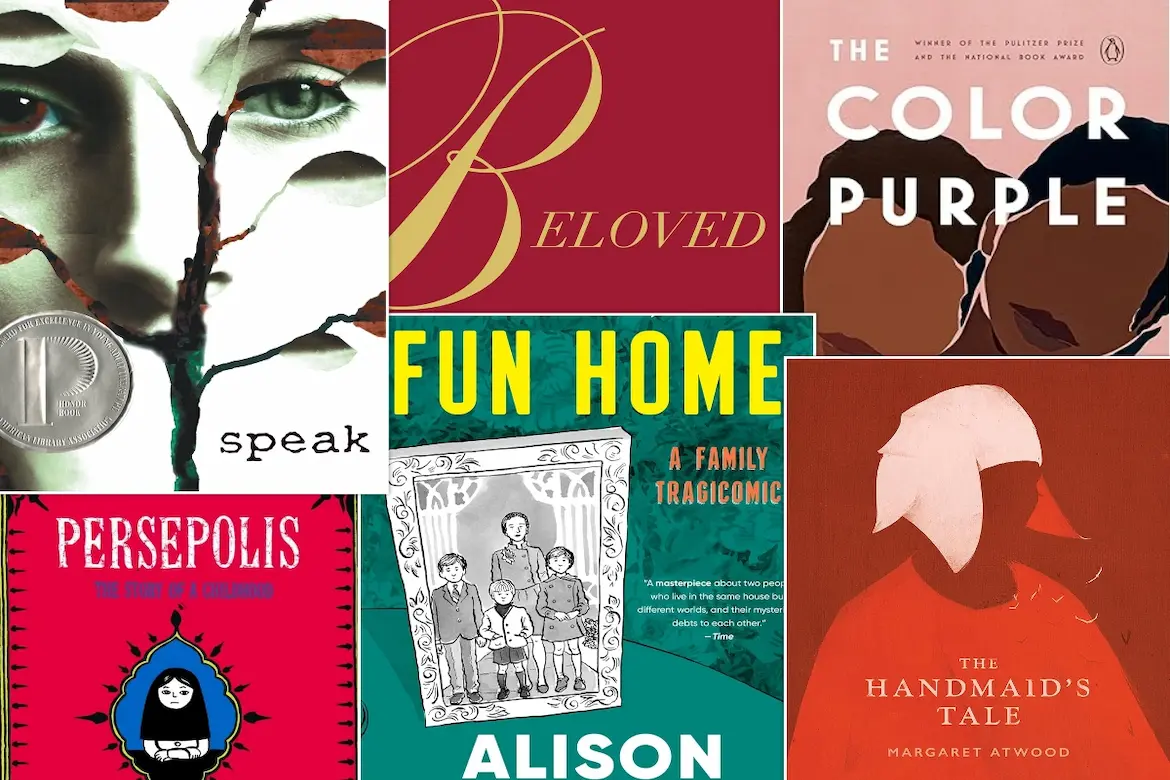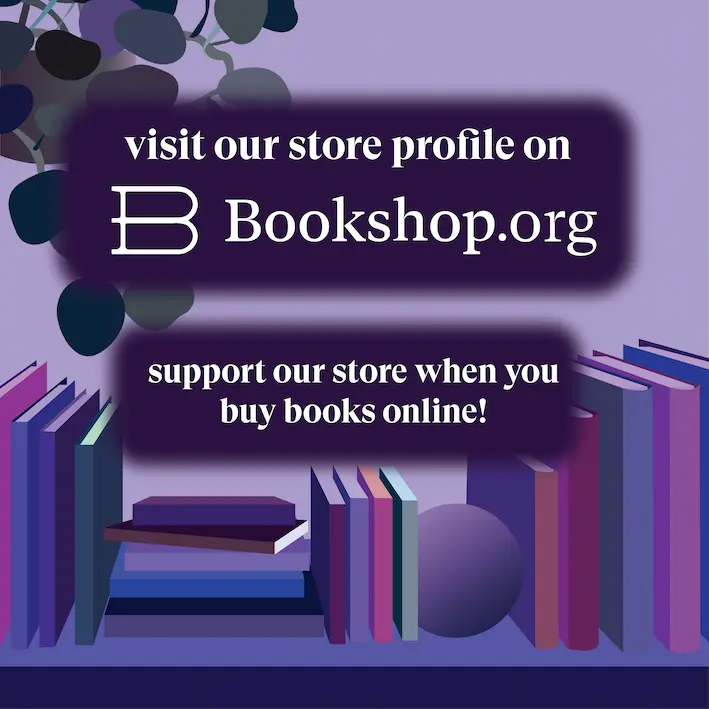In the world of literature, banned books by women hold a unique and powerful place. They challenge societal norms, push boundaries, and often provoke heated debates. In this Litstack Rec we present 6 banned books.
You can find and buy the books we recommend at the LitStack Bookshop on our list of LitStack Recs.

In This LitStack Rec of Banned Books by Women
The Enduring Impact of Banned Books
In the world of literature, banned books by women hold a unique and powerful place. They challenge societal norms, push boundaries, and often provoke heated debates. These works are more than just stories; they are reflections of the times and cultures from which they emerge. Each book tells a tale not only of its characters but also of the world that sought to silence it. This makes them essential reads for anyone interested in the intersection of art, culture, and politics.
Understanding why these books face censorship reveals much about the cultural and political climates that fuel such actions. Censorship in literature often stems from fear—fear of change, fear of truth, fear of voices that refuse to be quieted. By examining these banned books by women, we gain insight into the issues that society finds most challenging or threatening. In doing so, we empower ourselves with knowledge and foster a deeper appreciation for the courage it takes to speak out through writing.
In this article, we delve into six contemporary novels by women that have been included in lists of banned books. Each offers a unique perspective on the struggles and triumphs of their time. As we explore these works, we celebrate the resilience of their authors and the enduring impact of their words. Join us as we journey through these pages, uncovering the stories in banned books that refuse to be silenced.
6 Banned Books by Women You Must Own and Read
The Handmaid’s Tale by Margaret Atwood
“The most poetically satisfying and intense of all Atwood’s novels.”—Maclean’s
Margaret Atwood’s The Handmaid’s Tale is a seminal work in feminist literature, offering a chilling exploration of totalitarianism and the subjugation of women. Set in the dystopian society of Gilead, the novel presents a future where women’s rights have been stripped away, reducing them to mere vessels for reproduction. Through the eyes of the protagonist, Offred, readers witness the oppressive machinations of a patriarchal regime and the quiet, resilient defiance of its female subjects. Atwood’s incisive commentary on the fragility of women’s rights and autonomy resonates with readers, making it a powerful narrative that continues to challenge and inspire discussions about gender equality and power dynamics.
The Handmaid’s Tale has faced frequent challenges and bans due to its unflinching portrayal of sexual violence, religious extremism, and political repression which have led to its inclusion on lists of banned books. Critics argue that its graphic content and dark themes make it unsuitable for certain audiences, particularly in educational settings. However, these very elements are crucial for sparking critical conversations about censorship and the importance of literary freedom. By banning such books by women, we risk silencing vital women’s voices in literature that shed light on uncomfortable truths and societal injustices.
The impact of The Handmaid’s Tale on feminist literature and cultural discourse is undeniable. Since its publication, the novel has inspired numerous adaptations, including a critically acclaimed television series that has further amplified its themes to new generations. Atwood’s work has become a touchstone for feminist activism, symbolizing resistance against regressive policies and advocating for women’s rights worldwide. As readers engage with this powerful narrative, they are reminded of the significance of protecting literary freedom and ensuring that diverse women’s voices continue to be heard in literature, challenging norms and inspiring change.


Beloved by Toni Morrison
“A masterwork…. Wonderful…. I can’t imagine American literature without it.”—John Leonard, Los Angeles Times
Toni Morrison’s Beloved is a profound exploration of historical trauma and the enduring legacy of slavery in America. Set in the aftermath of the Civil War, the novel delves into the harrowing experiences of its protagonist, Sethe, an escaped slave who is haunted by the ghost of her deceased daughter. Through richly woven narratives and vivid storytelling, Morrison confronts the brutal realities of slavery, exposing the psychological scars it leaves on individuals and communities. The novel’s unflinching portrayal of pain and resilience challenges readers to confront uncomfortable truths about America’s past, making it a frequent target among challenged books.
The graphic content and language in Beloved have sparked significant controversies, often leading to its inclusion in lists of banned books. Critics have cited its explicit depictions of violence, sexuality, and supernatural elements as reasons for its removal from school curriculums and libraries. However, these very aspects are integral to its narrative power, compelling readers to grapple with the full scope of its themes. By confronting these difficult issues head-on, Morrison forces us to reckon with the impact of slavery not just as a historical event but as a continuing influence on American society.
Beyond its controversies, Beloved has made invaluable contributions to discussions on race and history in America. It challenges dominant historical narratives by centering the voices of those historically marginalized. The novel has become an essential text in academic settings, sparking dialogues about racial injustice, memory, and healing. Its powerful storytelling invites readers to engage with history on a deeply personal level, offering insights into the complexities of identity and community in the face of systemic oppression. As both a work of art and a call to action, Beloved underscores the importance of literary freedom and the enduring relevance of stories that challenge societal norms.


The Color Purple by Alice Walker
“Superb . . . A work to stand beside literature of any time and place.”—San Francisco Chronicle
Alice Walker’s The Color Purple is a profound exploration of the intertwined themes of racism, sexism, and resilience. Set in the early 20th century American South, the novel follows the journey of Celie, an African American woman who overcomes a life of oppression and abuse. Through her letters, Celie finds her voice and strength amidst a world that tries to silence her. Walker’s poignant narrative not only highlights the systemic racism faced by African Americans but also delves deeply into the misogyny that compounds their struggles. Her portrayal of strong female characters who support and uplift each other offers a powerful testament to the resilience of women.
Despite its critical acclaim, The Color Purple has faced numerous challenges and bans due to its explicit content and language. The novel’s candid depiction of sexual violence, incest, and abusive relationships has sparked cultural controversy, particularly among those concerned about its suitability for younger audiences. However, it is precisely this raw honesty that makes Walker’s work so impactful. By confronting these difficult realities head-on, she invites readers to grapple with the uncomfortable truths about society’s darker undercurrents. This willingness to address taboo subjects head-on is a hallmark of many banned books by women, highlighting the often-political climate that leads to their censorship.
The Color Purple has significantly influenced conversations about intersectionality and empowerment. Walker’s narrative sheds light on the compounded discrimination faced by African American women, urging readers to consider the complex layers of identity and oppression. Her work has inspired countless discussions around race, gender, and power dynamics, both in academic circles and broader cultural dialogues. By weaving a tapestry of personal transformation and collective solidarity, Walker empowers readers to envision a world where marginalized voices are heard and valued. Her novel remains a cornerstone in literature, challenging us to confront societal injustices while celebrating the enduring spirit of those who resist them.


Persepolis by Marjane Satrapi
“You’ve never seen anything like Persepolis—the intimacy of a memoir, the irresistability of a comic book, and the political depth of a the conflict between fundamentalism and democracy. Marjane Satrapi may have given us a new genre.”—Gloria Steinem
Persepolis, a groundbreaking graphic memoir by Marjane Satrapi, offers an intimate and eye-opening glimpse into the life of a young girl growing up during and after the Iranian Revolution. Through her stark black-and-white illustrations and poignant storytelling, Satrapi shares her personal journey in navigating the complexities of political upheaval, cultural shifts, and personal identity. As both a coming-of-age story and a historical account, Persepolis is a testament to the power of freedom of expression, providing readers with a deeper understanding of the socio-political landscape of Iran during a tumultuous period.
Despite its critical acclaim and widespread readership, Persepolis has faced bans and challenges due to its political and religious content, which some consider controversial and have led the book to be placed on banned books lists. The book’s candid depiction of life under a repressive regime, combined with its critique of fundamentalist practices, has led to its removal from certain educational curricula and libraries. These bans often stem from fears that the book may incite political dissent or challenge prevailing religious norms. However, these very aspects of Persepolis are what make it such an essential piece of feminist literature; it amplifies the voices of those often silenced by authoritarian rule and encourages dialogue on issues of freedom and oppression.
Beyond its immediate narrative, Persepolis plays a crucial role in fostering a greater understanding of Middle Eastern cultures and history among Western audiences. By sharing her personal experiences, Satrapi humanizes the often misunderstood and misrepresented region, bridging cultural divides through empathy and education. The memoir encourages readers to reconsider preconceived notions about Iran and the wider Middle East, highlighting the universal struggles for autonomy and self-expression that resonate across borders. In doing so, Persepolis not only enriches our understanding of a pivotal historical moment but also contributes to the broader discourse on global feminism and the fight for individual freedoms.


Fun Home by Alison Bechdel
“Graphic storytelling at its most profound.” —Los Angeles Times, Favorite Book of the Year
Alison Bechdel’s Fun Home: A Family Tragicomic stands as a poignant and intricate exploration of personal identity, particularly within the LGBTQ+ community. This graphic memoir traces Bechdel’s coming-of-age story as she navigates her own sexual identity alongside the complexities of her relationship with her father. The novel delves into themes of self-discovery, family secrets, and the struggle for acceptance in a world that often marginalizes those who do not conform to its norms. Through a blend of detailed illustrations and candid narrative, Fun Home offers an authentic portrayal of Bechdel’s journey, making it a staple among banned books by women due to its unflinching honesty.
Despite its critical acclaim, Fun Home has faced numerous challenges and is included in lists of banned books, primarily due to its sexual content and LGBTQ+ themes. Some educators and parents have argued that the explicit depiction of Bechdel’s experiences is inappropriate for younger audiences. However, supporters of the memoir emphasize the importance of such narratives in providing visibility and understanding for LGBTQ+ individuals. By confronting issues of identity and sexuality head-on, Bechdel’s work opens up crucial conversations around these topics, encouraging readers to reflect on their own beliefs and biases.
Fun Home has significantly impacted LGBTQ+ representation in literature, serving as a vital reading recommendation for those seeking to understand the nuanced realities of queer life. The memoir has not only garnered praise for its artistic merit but also for its role in broadening the scope of what stories are told in the literary world. By challenging traditional narratives and embracing diverse voices, Bechdel’s work has paved the way for other controversial novels that tackle similar themes. Ultimately, Fun Home reminds us of the power of storytelling to foster empathy, challenge societal norms, and celebrate the richness of human experience in all its forms.


Speak by Laurie Halse Anderson
“Melinda’s pain is palpable, and readers will totally empathize with her. This is a compelling book, with sharp, crisp writing that draws readers in, engulfing them in the story.”—School Library Journal
Speak by Laurie Halse Anderson is a seminal work in young adult literature, shedding light on the profound impact of teenage trauma and the arduous path to recovery. The novel tells the story of Melinda Sordino, a high school freshman who becomes selectively mute after experiencing sexual assault at a summer party. Anderson deftly portrays Melinda’s internal struggle, using her silence as a powerful metaphor for the isolation and shame that many survivors feel. Through Melinda’s journey, readers gain insight into the complexities of healing and the importance of finding one’s voice in the face of adversity.
The book has faced significant controversy due to its candid portrayal of sexual assault, leading to challenges and inclusion in banned books lists and in various educational settings. Critics often cite concerns about the explicit nature of the content, arguing that it may be inappropriate for younger audiences. However, supporters contend that Speak addresses crucial issues that are often silenced in society, providing a platform for dialogue and understanding. By confronting these difficult topics head-on, Anderson encourages readers to empathize with survivors and recognize the pervasive nature of such traumas.
In the realm of young adult literature, Speak holds an essential place for its unflinching exploration of challenging themes. It serves as a vital resource for educators and students alike, offering a framework for discussing sensitive issues in a safe and constructive manner. The novel has inspired countless readers to engage in conversations about consent, resilience, and empowerment, fostering a culture of openness and support. By reading Speak, individuals are invited not only to witness Melinda’s transformation but also to reflect on their own roles in advocating for change and understanding within their communities.


Empowering Voices Through Banned Books
Reading banned books by women is a powerful way to engage with diverse perspectives and challenge societal norms. These works, often controversial and provocative, offer invaluable insights into cultural, political, and personal struggles. By delving into these stories, we gain a deeper understanding of issues such as totalitarianism, racial injustice, and intersectionality. The courage these authors exhibit in tackling difficult subjects enriches our educational landscape and broadens our cultural awareness.
Supporting literary freedom and expression is crucial in preserving the integrity of literature. As readers, educators, and activists, we have the power to champion these voices by reading and sharing their stories. Let us embrace the challenge to explore these influential works, fostering dialogue and empathy in our communities. By doing so, we not only celebrate the resilience and creativity of women authors but also affirm our commitment to a more inclusive and informed society.
~ J.S. Hood


Other LitStack Resources
Be sure and look at our other LitStack Recs for our recommendations on books you should read, as well as these reviews by Lauren Alwan, and these reviews by Rylie Fong, Allie Coker, and Sharon Browning.
As a Bookshop, Malaprop’s, BAM, Barnes & Noble, Audiobooks.com, Amazon, and Envato affiliate, LitStack may earn a commission at no cost to you when you purchase products through our affiliate links.





